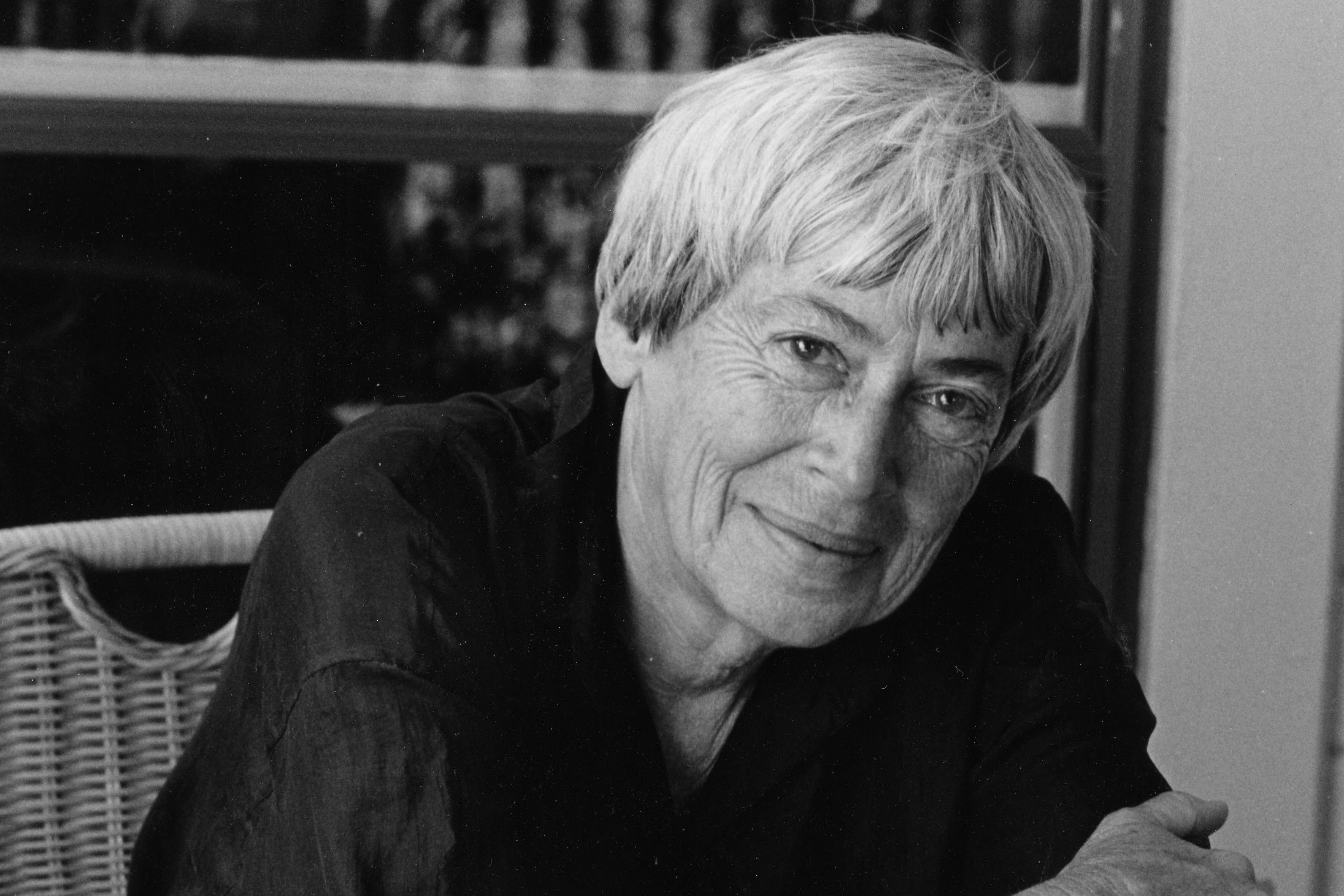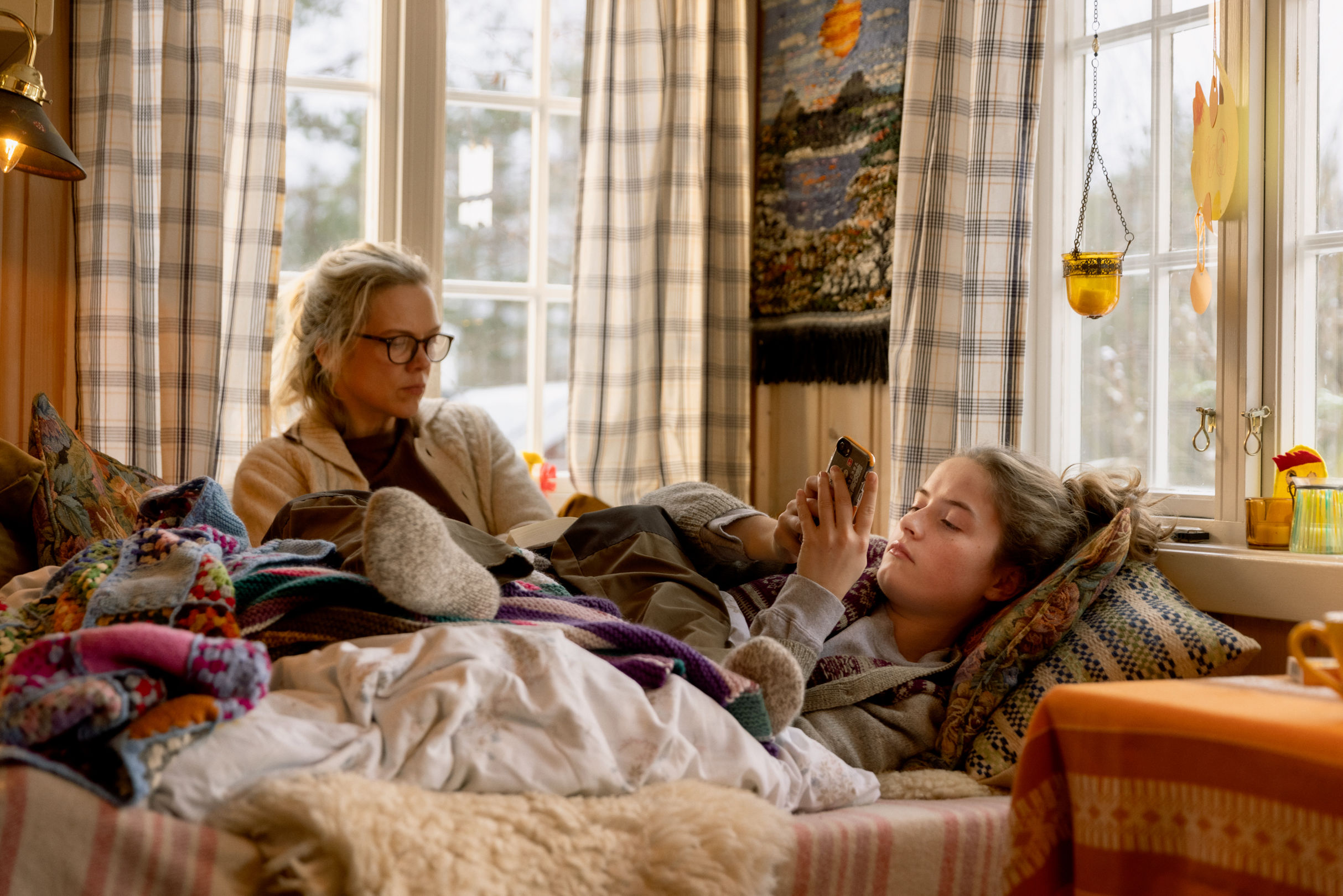For Belinda Carroll, Comedy and Activism Go Hand in Hand
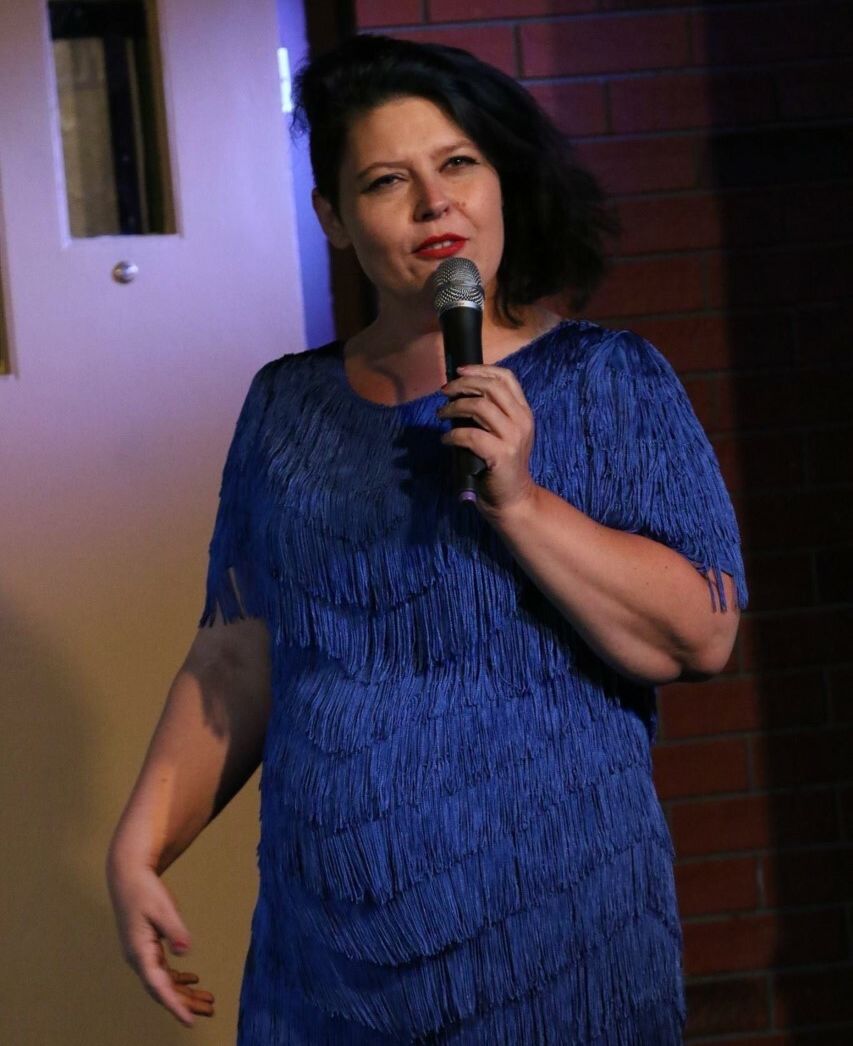
Belinda Carroll knows the worlds of Portland activism and performance better than most. That's because she helped build them.
Image: Belinda Carroll
The year was 1994, and a teenage Belinda Carroll—the same woman who would go on to found the Portland Queer Comedy Festival and work on Portland Dyke March for years—was dancing and lip-syncing onstage at notorious West Burnside all-ages, gay-friendly disco the City.
For the freaks, the punks, and the LGBTQ kids with nowhere else to go like Carroll, the City was a technicolor haven of denim, leather, and glitter with dancing and drag shows running into the wee hours of the morning.
“We used to have these big stage productions with six to ten people onstage sometimes. And we’d practice the choreography for a week," Carroll recalls. "Plus we’d have Lady Oh Boulevard and all these really amazing drag queens: Poison Waters, Patti O’Dora, and Bolivia Carmichael, who’s now a drag queen over at CC Slaughters.”
The City had also drawn the ire of Portland police and city council, who tried and failed to shut down the disco multiple times. City leaders often resorted to pearl clutching over the club's open attitudes towards creative expression, drugs, and sexuality. “Tempest Centers on The City,” declared one Oregonian headline. “Is the City Nightclub a sanctuary where kids can find acceptance—or a den of illicit sex and drugs?”
At the time, Belinda Carroll was a houseless teenager, roaming what was then the center of Portland gay life: Old Town. Packs of houseless queer kids would bounce around the area, affectionately dubbed the Pink Triangle, from dance nights at Panorama Nightclub on SW 10th Ave (now the Living Room Theater), the Dirty Duck on SW Third and Glisan, Scandals on SW Stark, and gay strip club mainstay Silverado. Spilling out onto the street were young guys hustling, leather daddies straight out of a Tom of Finland drawing, and punk lesbians with spiked hair and dog collars around their necks.
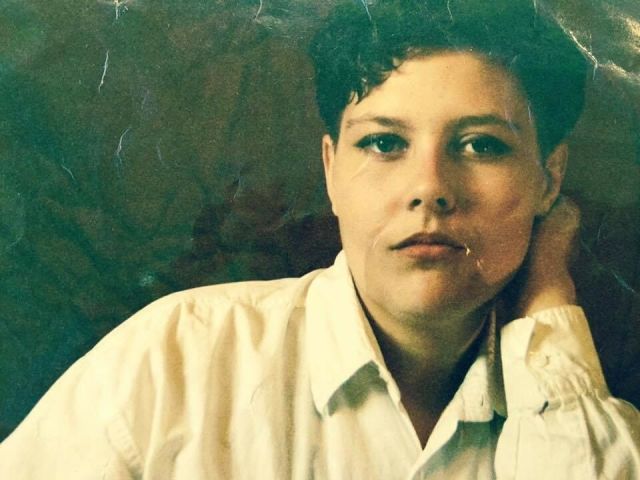
Belinda Carroll got her start performing at the City Nightclub in Old Town in the 90's.
Image: Belinda Carroll
This was Carroll’s scene, her community. Older members of the LGBTQ community looked after the younger ones. Lanny Swerdlow, the owner of the City, had taken her in, given her a job working the door at the club, and made room on the stage for her to perform. So when city council and the Portland Police started to target the nightclub, Swerdlow, Carroll, and others in the community pushed back, protesting by the hundreds at Portland City Hall. They even helped produce a 1996 documentary directed by Gregory Franklyn about the club and its battles with Portland city leaders.
“That’s when I realized performance can be activism,” says Carroll.
Belinda Carroll knows the worlds of Portland activism and performance better than most; that's because she helped build them. An organizer for Portland Dyke March, Carroll now consistently performs at Portland Pride Festival and annual political events like SlutWalk. She has also put together scores of events to benefit groups like the ACLU and Planned Parenthood.
Although she’s a singer, writer, and producer, Carroll is best known for her cheeky stand-up comedy and bawdy variety shows. She co-founded the Portland Queer Comedy Festival in 2017 and has performed hundreds, possibly even thousands of shows nationwide.
Now, after living nearly her whole life in Portland, she’s moving to Los Angeles, like so many comedians before her, to chase that next big move.
Over the years, Carroll’s raked up a pile of accolades. She received the 2011 Pride NW Pride-in-Action Award for founding Q Patrol, a community safety group dedicated to reducing hate crimes against LGBTQ people in downtown Portland, and in 2018 she received the Queer Hero Award from the Gay and Lesbian Archives of the Pacific Northwest. Last year, just days before lockdown, Carroll received the Oregon Woman of Achievement Award from Governor Kate Brown herself.
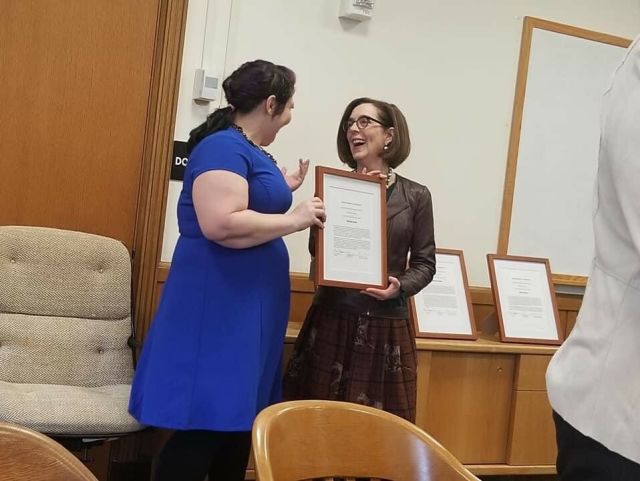
Belinda Carroll receiving the Oregon Women of Achievement Award from Governor Kate Brown in 2020. No big deal.
Image: Belinda Carroll
Carroll got her start as an activist when she was still a Portland teenager, but she didn’t take up comedy until 2008 after she had left Portland for Austin, Texas. It felt natural to mix politics and rage with comedy and laughter. At her first set, an open mic at the Capitol City Comedy Club, she channeled her political anger into her jokes, riffing on Sarah Palin, who had just been announced as John McCain’s running mate.
The set was a hit, with clips from it eventually going up on Rooftop Comedy, a popular website that featured the sets of stand-ups from all across the country.
Caroll never knew quite how far she would take the whole comedy thing, but her friends never let her give it up. “I started comedy and everyone else was like, ‘“OK, that’s what you do now!’” she laughs.
She answered a Craigslist ad for improv classes, which ended up being taught by Second City instructor and Carroll’s eventual mentor Tom Booker. Soon she had co-founded the Three Dollar Bills, the only LGBTQ-specific comedy troupe in Texas at the time, and was performing consistently at Capitol City and the Rusty Spurs, an Austin gay bar.
But when Carroll moved back to Portland in 2010 to be closer to family, things were different. She had left behind a bustling comedy scene for one that was just beginning to find its footing. Events for women and LGBT folk were few and far between, but when they did happen, they were cozy and idiosyncratic.
Carroll recalls open mic nights at the Boiler Room Karaoke Bar (now a Starbucks) and an one specifically for women and trans people, organized by Whitney Streed, at a tiny Polish bar called the Krakow Café across the street from the Alibi (the bar is now a weed dispensary).
Seeing a space and a desire for more comedy, especially more queer comedy, Carroll decided to start organizing her own events, variety shows, and festivals.
Virginia Jones, a fellow comedian who helped lure Carroll back to Portland, remembers it as an era of excitement and possibility as they started to create spaces and events for themselves.
"Belinda was always much more of a go-getter than I was about putting together shows and finding venues," Jones recalls. "I really respected her hustle, but I like to just show up places and perform. I was impressed when she started performing at Portland Pride and really creating a comedy scene in queer spaces," says Jones.
Things look a lot different these days for comics in Portland, with more open mic nights and opportunities for marginalized people to take center stage—and at least part of that is thanks to people like Carroll.
"Portland's scene has exploded! Every time I go back there's great stuff going on and hundreds of new faces. The women and queer comics are getting really strong," says Jones. "I don't know if anyone gives Belinda and Whitney Streed credit for creating and holding that space, but they really worked hard."
Carroll has noticed a change too. “Ten years ago, it was all straight white dudes in comedy. Now there’s so many people doing weird and interesting comedy,” says Carroll.
One time in 2012, Carroll was performing in Longview, Washington at the Cadillac Ranch Casino. The room was full of loggers dressed in camo and ball caps, shifting restlessly in their seats as she got onstage. Carroll launched into her set, starting with a riff on same-sex marriage. Legalization of gay marriage was still a few years out, and the crowd was clearly not on board. One man in particular started heckling Belinda, and she froze.
“I was like, ‘It’s my nightmare. There’s a whole room of them!’” she remembers with a laugh.
Then, from the back of the room, an older woman took on the heckler and drawled, “You need to shut the fuck up, Larry.” The whole room erupted into laughter. Later, Carroll chatted with the older woman who confronted the heckler. “She told me, ‘I lived in San Francisco in the ’50s. You can’t pull nothing on me. I know everything.’”
More than ten years after she started stand-up, Carroll has left a huge mark on a comedy scene that’s producing more and more bona fide stars every year, including Ron Funches and Ian Karmel. For now, though, Carroll is looking forward. She’s ready to start singing live more and eventually get a one woman show off the ground. She’s also working on a weekly radio show for XRAY FM and other podcast outlets called My First Gay Bar, using humor to look back at LGBTQ communities and bridge the gap between different generations of queer people.
At the end of this year, like so many comedians before her, Carroll will say goodbye to the City of Roses and hello to the City of Angels. Decades after she got her start as a dramatic teenager onstage at the City, it’s finally the moment for her to go all in.
“All this time I thought I could picture my life without comedy. Then the whole pandemic happened, and it was so drab. I realized this is a thing that I need,” she says. “It’s music. It’s comedy. It’s everything. I need performance.”
Catch Belinda Carroll before she leaves at the Siren Theater on December 30 at 8 p.m.


